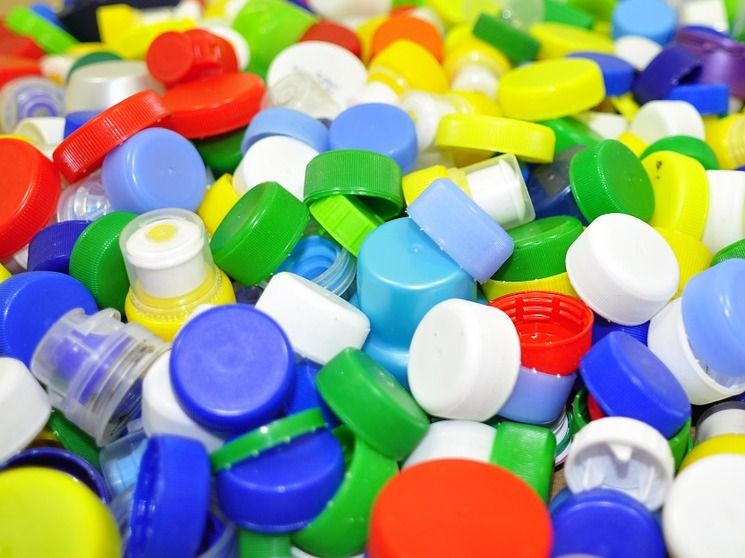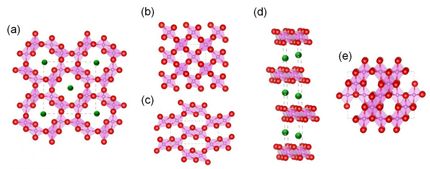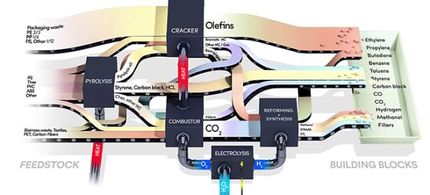Scientific advances can make it easier to recycle plastics
Most of the 150 million tons of plastics produced around the world every year end up in landfills, the oceans and elsewhere. Less than 9 percent of plastics are recycled in the United States, rising to about 30 percent in Europe.

articonn; pixabay.com; CC0
That's a $176 billion problem, the potential energy savings scientists say could be achieved from recycling all global plastic solid waste. But new approaches can increase the amount of plastic waste that can be successfully recycled, researchers from the University of Houston and IBM report in a perspective.
That means developing new plastics that are more easily recycled, along with finding ways to more efficiently recycle existing plastics. These approaches can range from methods to recycle different types of plastics together in one waste stream, avoiding a costly and time-consuming sorting process, as well as methods to break down plastics in a more energy-efficient manner.
"Recent research points the way toward chemical recycling methods with lower energy requirements, compatibilization of mixed plastic wastes to avoid the need for sorting, and expanding recycling technologies to traditionally nonrecyclable polymers," wrote the article authors, Megan L. Robertson, associate professor of chemical and biomolecular engineering at UH, and Jeannette M. Garcia, a polymer chemist at the IBM Almaden Research Center.
Improving methods to recycle existing plastic materials is a key priority. "New materials enter the market slowly, and thus the biggest impact is in developing more efficient methods to recycle the plastics that are produced in large quantities today," said Robertson. "One the other hand, research advances can pave the way for more easily recyclable materials for the future." One example is the category of polymers known as thermosets, which can't be melted down for repurposing, preventing their recycling with traditional methods. Robertson's lab develops biorenewable components for thermosets, replacing hydrocarbon-based polymers with those made from vegetable oils or other plant-based materials. That could lead to new end-of-life options such as composting or chemical recycling for these materials, a huge leap forward.
The perspective is part of a series published by Science to explore issues related to the environmental impact of polymers, including their source (petroleum vs. biosources), advances in recycling and biodegradable polymers.
Robertson and Garcia note three key issues:
- Plastics must be sorted for recycling, which adds effort and expense. Plastics, or polymers, are comprised of large molecules, so most don't mix when heated, similar to the interaction between oil and water. Research is focused on finding substances that can facilitate the mixing of different types of plastics, known as compatibilizers, allowing them to be recycled together. Finding a compatibilizer that works for all polymers would be ideal, but Robertson said current technology requires a tailored approach for each plastic mixture.
- Chemical recycling involves using a catalyst to break down plastics to produce lower-molecular-weight products, a process the researchers say has been hindered by high energy costs. Work to develop more efficient catalysts is underway.
- The majority of plastics currently recycled are composed of polyethylene terephthalate (PET), which is the component used in most water bottles, and polyethylene, the most highly produced plastic. Expanding recycling technologies to other plastics beyond PET and polyethylene is an ongoing area of research. Even more challenging is developing methods for recycling polymers that can't be processed through melting at elevated temperatures, such as thermosets and elastomers (rubber materials).
With any potential solution, the researchers say it is critical that a material's performance isn't impacted in order to make it easier to recycle. Subjecting plastics to many use and recycling cycles without loss of performance is an open challenge for researchers.
"Enhancing plastics recycling beyond the current level has many potential societal advantages, such as reducing greenhouse gas emissions, avoiding waste buildup in the environment, decreasing the dependence on finite petroleum resources for its production, and recovering the economic value of plastic solid waste," the researchers wrote.
That has begun, they say, pointing to start-up companies that have scaled up chemical recycling methods for polystyrene waste or developed sorting processes to separate materials into pure feedstocks.
That and other research, they wrote, "raise hope that before long, recycling rates for plastics will be much higher than today."
Original publication
Garcia, Jeannette M. and Robertson, Megan L.; "The future of plastics recycling"; Science; 2017


































































